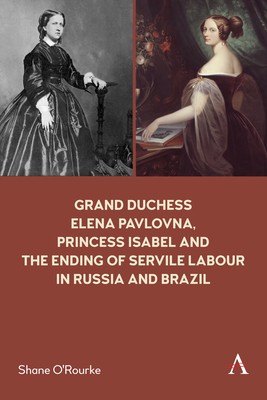
- We will send in 10–14 business days.
- Author: Shane O'Rourke
- Publisher: Anthem Press
- ISBN-10: 1839983167
- ISBN-13: 9781839983160
- Format: 15.2 x 22.9 x 0.7 cm, softcover
- Language: English
- SAVE -10% with code: EXTRA
Grand Duchess Elena Pavlovna, Princess Isabel and the Ending of Servile Labour in Russia and Brazil (e-book) (used book) | bookbook.eu
Reviews
Description
Grand Duchess Elena Pavlovna was a German princess from the Kingdom of Wurttemburg who was selected to be the wife of Grand Duke Mikhail, the brother of Emperors Alexander I and Nicholas I. Princess Isabel was the daughter of the Brazilian Emperor Dom Pedro II and heir to the throne. Both women were major players in the politics of emancipation in Russia in 1861 and in Brazil in 1888 respectively. Like many women their political activities have been marginalized or completely written out of the historical record. This book chronicles the political lives of these two women, culminating in two of the most momentous emancipations of the nineteenth century. It does so in a way that sets the two women in the context of their societies. Russia was the largest servile society in the world with over 40 million serfs at the time of emancipation while Brazil was the first slave society in the Americas and the last to free its slaves.
By detailing emancipation in the Russian and Brazilian empires, this book offers a broader understanding of that process, showing what they had in common as well as what differentiated them. Both empires were monarchies in which the emperors ruled as well as reigned, both excluded women from any political role and both were servile societies. Without denying the importance of the struggles of the oppressed themselves for freedom nor the impact of economic changes, this book prioritizes high politics as an essential component of the emancipations. Monarchy, gender roles and emancipation converged in the persons of Grand Duchess Elena Pavlovna and Princess Isabel in ways that had a decisive impact on the fact of emancipation and the form that it took.
EXTRA 10 % discount with code: EXTRA
The promotion ends in 16d.05:25:13
The discount code is valid when purchasing from 10 €. Discounts do not stack.
- Author: Shane O'Rourke
- Publisher: Anthem Press
- ISBN-10: 1839983167
- ISBN-13: 9781839983160
- Format: 15.2 x 22.9 x 0.7 cm, softcover
- Language: English English
Grand Duchess Elena Pavlovna was a German princess from the Kingdom of Wurttemburg who was selected to be the wife of Grand Duke Mikhail, the brother of Emperors Alexander I and Nicholas I. Princess Isabel was the daughter of the Brazilian Emperor Dom Pedro II and heir to the throne. Both women were major players in the politics of emancipation in Russia in 1861 and in Brazil in 1888 respectively. Like many women their political activities have been marginalized or completely written out of the historical record. This book chronicles the political lives of these two women, culminating in two of the most momentous emancipations of the nineteenth century. It does so in a way that sets the two women in the context of their societies. Russia was the largest servile society in the world with over 40 million serfs at the time of emancipation while Brazil was the first slave society in the Americas and the last to free its slaves.
By detailing emancipation in the Russian and Brazilian empires, this book offers a broader understanding of that process, showing what they had in common as well as what differentiated them. Both empires were monarchies in which the emperors ruled as well as reigned, both excluded women from any political role and both were servile societies. Without denying the importance of the struggles of the oppressed themselves for freedom nor the impact of economic changes, this book prioritizes high politics as an essential component of the emancipations. Monarchy, gender roles and emancipation converged in the persons of Grand Duchess Elena Pavlovna and Princess Isabel in ways that had a decisive impact on the fact of emancipation and the form that it took.


Reviews